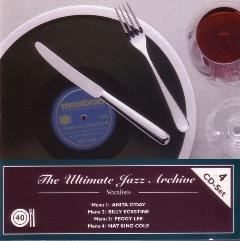The Ultimate Jazz Archive Vol.158 – Billy Eckstine [1944-1947] [2005]
The Ultimate Jazz Archive Vol.158 – Billy Eckstine [1944-1947] [2005]

01.I’ve Got A Date With Rhythm 02.I Stay In The Mood For You 03.Good Jelly Blues 04.I Want To Talk About You 05.The Real Thing Happened To Me 06.Blowing The Blues Away 07.If That’s The Way You Feel 08.I Love The Rhythm In A Riff 09.Last Night 10.Oo Bop Sh’ Bam 11.I Love The Loveliness Of You 12.In The Still Of The Night 13.Jelly Jelly 14.My Silent Love 15.Time On My Hands 16.All The Things You Are 17.In A Sentimental Mood 18.All Of Me 19.Where Are You 20.Prelude To A Kiss 21.She’s Got The Blues For Sa
One of the most distinctive of all ballad singers, Eckstine was both a pivotal figure in the history of jazz (because of his commitment to bebop) and the first black singer to achieve lasting success in the pop mainstream. After winning a talent contest in 1930 by imitating Cab Calloway, Eckstine sang briefly with Tommy Myles’ band, before returning to college. On the recommendation of composer and tenor saxophonist Buddy Johnson he joined Earl Hines’ band in 1939 as singer and occasionally playing trumpet and in turn encouraged Hines to sign up Charlie Parker and Sarah Vaughan. Eckstine’s recordings with the band include ‘Stormy Monday Blues’ and his own ‘Jelly Jelly’. In 1943, he quit to go solo but in 1944 formed his own big band, a modern swing band committed almost exclusively to bebop, to the point where Eckstine’s stylized vocals regularly took second place to the playing of Dizzy Gillespie, Dexter Gordon, Art Blakey, Charlie Parker, Fats Navarro, Gene Ammons and Kenny Dorham, among others. The band was badly recorded and badly managed and in 1947 Eckstine folded it to go solo. However, the support Eckstine gave bop musicians at that time was crucial.
Even before folding his band, Eckstine had recorded solo to support it, scoring two million-sellers in 1945 with ‘Cottage for Sale’ and a revival of ‘Prisoner of Love’. Far more successful than his band recordings, though more mannered and pompously sung, these prefigured Eckstine’s future career. Where before black bands had played ballads, jazz and dance music, in the immediate post-war years they had to choose. Lacking an interest in the blues and frustrated by the failure of his big band, Eckstine, at first reluctantly, turned to ballads. Henceforth his successes would be in the pop charts.
In 1947, he was one of the first signings to the newly established MGM Records and had immediate hits with revivals of ‘Everything I Have Is Yours’ (1947), Richard Rodgers’ and Lorenz Hart’s ‘Blue Moon’ (1948), and Duke Ellington’s, Irving Mills and Juan Tizol’s ‘Caravan’ (1949). He had further success in 1950 with Victor Young’s theme song to ‘My Foolish Heart’ and a revival of the 1931 Bing Crosby hit, ‘I Apologize’. However, unlike Nat ‘King’ Cole who followed him into the pop charts, Eckstine’s singing, especially his exaggerated vibrato, sounded increasingly mannered and he was unable to sustain his recording success throughout the decade. His best record of the fifties was the thrilling duet with Sarah Vaughan, ‘Passing Strangers’, a minor hit in 1957.
Eckstine later concentrated on live appearances, regularly crossing the world, and recorded only intermittently. In 1967, he briefly joined Motown and in 1981 recorded the impressive ‘Something More’. --- vervemusicgroup.com
download: uploaded yandex 4shared mediafire solidfiles mega filecloudio nornar ziddu
